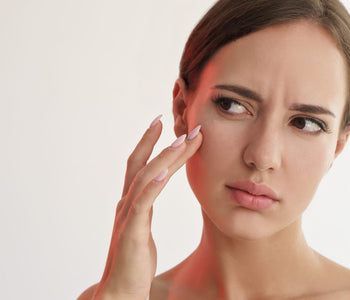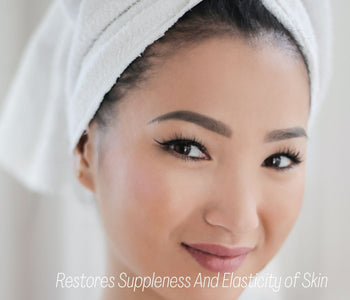Medically reviewed by Minimalist Health Specialist - Written by Shreya Singh (Pharmacist) on 19th Sep 2020
No BS Guide to Retinol

Retinol has become the big beauty buzzword when it comes to skincare these days. Every other anti-aging formulation in the market lists it as an ingredient that claims to be the penultimate solution for all your skin needs.
It has long been praised by researchers, dermatologists, beauty editors, and skincare fanatics alike as the “superhero ingredient in the battle against fine lines and wrinkles.” Some people even say that nothing fights the signs of aging better.
If you’re wondering why there’s so much hype about this ingredient; And should you incorporate it into your skincare regimen? We have answered all these questions and many more.
Retinoids are a big family of compounds, and it is obvious to get confused with their names (or benefits and uses). You need not worry as we will walk you through everything to make the best choice for you. (Ready to get excited?)
Here’s the ultimate guide to the “queen of anti-aging skincare” - Retinol, which includes everything you need to know about what Retinol is, its benefits, uses, and potential side effects that could help you to amp up your skincare game!
A Brief History Of Retinol (where it all began)
Retinol was originally developed to treat acne in the 1970s. Its anti-aging properties were discovered by accident when it was observed that the patients who had been prescribed retinol, had healthier skin; their wrinkles lessened, pigmentation became lighter, and skin became smoother.
It's discovery induced a magnificent wave of transformation in the skincare industry. Since then, it started going viral as a powerful anti-aging ingredient and has been praised numerous times as a revolutionary youth-enhancing active.
What Exactly Is Retinol?
In scientific terms, Retinol is one amongst the several types of retinoids available in the market for topical application. Retinoid is essentially a kind of umbrella term that is used for all vitamin A derivatives. Retinoids primarily stimulate collagen production and work on skin cell renewal. Hence, acting as an excellent anti-aging ingredient and giving you that youthful, supple skin.
When it comes to Retinoids, what many people don’t know is that there are various types of retinoids available in the market. In most countries, Retinol can be bought over-the-counter without prescription; however, other Retinoids like Retinoic acid or Tretinoin require a doctor’s prescription.
Dermatologists often mention retinol as the "gold standard" anti-aging ingredient because it is universally accessible and has decades of research proving its effectiveness.
What Does Retinol Do For Your Skin (How it Works)?
Studies show that the topical application of retinol significantly affects both the cellular and molecular properties of the epidermis and dermis.
It increases epidermal thickness and upregulates genes for collagen that boost collagen production, which is one of the fundamental building blocks of youthful skin—resulting in a significant reduction in facial wrinkles.
Dr. Madhuri Agarwal, A mumbai-based celebrity dermatologist told Minimalist that
“Hydrogenated Retinol and Peptides are powerful epidermal and dermal life-givers”
On its topical application, Retinol needs to be converted by the enzymes present in the skin into Retinoic acid, which is the active form of vitamin A to have biological outcomes.
When Retinol turns into Retinoic acid, it causes exfoliation at a molecular level, enabling skin cells to maintain regular cell rejuvenation. Long-term use of Retinol can help restructure the skin and promote cell proliferation, resulting in fading of hyperpigmentation, reduction in fine lines, revealing brighter, healthier skin, and smoother texture.
There’s no denying that Retinol is a powerhouse in itself. Let’s take a look at its wide array of skincare benefits.
Benefits of Topical Retinol for Skin
- Works like magic to smooth out wrinkles and fine lines by stimulating collagen production, improving skin elasticity.
- It also stimulates skin cell proliferation, which restores the skin's thickness, resulting in a firmer, smoother skin texture.
- It increases the pace of cell turnover and paves the way for new skin cells, which accounts for decreased hyperpigmentation, dark spots, or sunspots.
- Lightens dull skin by exfoliating at a cellular level, which results in a more luminous and refined complexion.
- It is a proven ingredient that treats acne by unclogging pores, limiting sebum overproduction, and preventing further outbreaks.
- It also reduces enlarged pores and increases skin resiliency.
- Its antioxidant properties decrease the effects of UV induced skin damage.
And the list continues. In short, it is your time machine to turn back the clock on your skin’s age.
If you have already made up your mind to try this ingredient, don’t just rush to buy one yet as there are high chances you might end up with wrong formulation (and disappointment).
How To Choose The Right Retinol For Your Skin?
While looking out for the best form of Retinol, please choose the one that best suits your skin type and is present in its most stable form (meaning encapsulated). Make sure that it allows deep absorption into the skin (e.g., Serums).
Different forms available:
Although there are enormous benefits of Retinoids, they have limited clinical use in its pure form (surprised?). It is due to photochemical instability and associated skin irritations.
As explained before, Retinol needs to be converted into Retinoic acid to be effective, which can be highly irritating for some. There are milder Retinyl esters such as Retinyl Palmitate or Retinyl Acetate available that do not cause irritation but are less potent than pure Retinols.
Research shows that it is as effective as Retinoids but causes no irritation. Also known as retinoic acid ester since it is directly related to retinoic acid. As mentioned earlier, our skin can interpret retinoic acid, the active ingredient. Other forms of retinoids need to be converted enzymatically to Retinoic Acid, which is the primary reason behind skin irritation. It's not the case with Granactive Retinoid. It directly binds to the retinoid receptors of the skin cells to work its magic (no wonder it is called next-generation anti-aging active).
Concentration percentage and their effects:
Concentrations of 0.01% Retinol or higher are shown to be efficient at diminishing several signs of aging, fading acne, hyperpigmentation, and overall enhancement of skin health. The higher the dose, the higher the benefits. You can achieve its maximum benefits by using at least 2% serum-containing Retinol or Retinoid Derivatives.
Pro-Tip
For beginners, start with a lower concentration and upgrade gradually as your skin becomes adjusted.
The better choice between Retinol serums and Retinol creams:
Since serums are lighter in feel and have a higher percentage of the active compound, they are better options over a topical retinoid cream. Also, a serum ensures deeper penetration of the ingredient into your skin because it is composed of very fine molecules. In contrast, the bigger and heavier molecules in the creams don’t penetrate deeper.
Creams can be useful for highly dehydrated skin as they contain hydrating ingredients or with sensitive skin.
Minimalist 2% Retinol serum is made with small molecule size Granactive Retinoid sourced from Grant Industries, USA, A leading global supplier in skincare.
Minimalist Retinol Serum
- Formulated with Granactive Retinoid that is a potent Retinoid without irritation.
- It is oil-based formula yet very light and absorbs quickly
- It is non-comedogenic, fragrance and odor free
- Contains no harmful chemical or skin irritants such as essential oils
How Can You Add Retinol To Your Skincare Routine?
Retinol can be included in their skincare regimen by anyone facing skin aging, be it in the form of fresh fine lines or the more aggressive wrinkles. Many dermatologists state that everyone should incorporate retinol in their skincare routine, especially after their 30s.
How to use Retinol Serum
- In the night after cleansing and toning, take a pea-sized quantity of Retinol on your fingertips with a dropper (using too much retinol can irritate the skin).
- Dab the product onto your face and neck; strictly avoid the lips, eye area(including eyelids), and corner of the eyes and massage gently until it has absorbed into the skin.
- For better outcomes, let it absorb into your skin for some time before applying your night cream or moisturizer.
- We all want clear and glowing skin overnight, but the truth is, skincare takes time to show results. To see noticeable anti-aging effects from Retinol, use it consistently for at least 2-3 months and make it a part of your daily skincare routine.
Pro Tips
Use Retinol only in the PM to restrict photosensitivity and irritation. Always make sure to apply a broad-spectrum sunscreen during the day when using Retinol.
Start with 2-3 times a week and gradually work your way up as tolerated.
Make sure your moisturizer barrier is healthy before using Retinol.
BFFs of Retinols
Hyaluronic acid: Your skin needs more hydration while using Retinoids as these active ingredients can be drying. Pairing it with 2 % Hyaluronic acid can solve your dryness issue and enhance performance by further reducing wrinkles and fine lines. Apply HA before Retinoids as Retinol serum is usually oil-based.
Benzoyl Peroxide: Few people might get shocked, looking at this ingredient here as many blogs and beauty experts ask you to avoid using them together. Truth is they can be a powerful anti-acne treatment when used together.
The only caution you have to take to avoid dryness is adding Hyaluronic acid in your routine. People with dry skin can use benzoyl peroxide as a spot treatment and Retinoid all over or use them alternate days. (do not combine the prescription Retinoids and Benzoyl peroxide medicines).
For better outcomes, let it absorb into your skin for some time before applying your night cream or moisturizer.
We all want clear and glowing skin overnight, but the truth is, skincare takes time to show results. To see noticeable anti-aging effects from Retinol, use it consistently for at least 2-3 months and make it a part of your daily skincare routine.
Does not go along with Retinols
Other Retinoids: Do not combine with formulations containing different forms of Retinoid or Retinoids as it can be too irritating for your skin to tolerate.
AHAs and BHAs are everyone's favorite ingredients when it comes to a skincare routine, be it anti-aging or anti-acne. It is believed that Retinols and direct acids do not go together (which is true to some extent when used at once), but that does not mean you cannot use both in your skincare routine.
At Minimalist, we usually advise having both in your skincare routine. Either use them in the morning and night or alternate days at night.
What Are The Potential Side Effects Of Retinol?
Topical Retinol is generally considered safe to use. However, it’s important to know how to use it and at what frequency and concentrations.
As said, “Too much of anything is bad for you,” this statement applies to retinol as well. If higher concentration (we are talking greater than 5%) is frequently used, it can result in redness or peeling of the skin.
With Retinols, it's sometimes a “worse-before-better” type of situation. Similar to any other skincare active, Retinol also requires time to settle down. It is also an active ingredient that promotes cell turnover, so purging is a natural reaction of your skin towards it.
However, purging recedes typically after 2-4 weeks as your skin adapts to the changes. So do not stop using products during the purging phase. Topical Retinol is generally considered safe to use. However, it’s important to know how to use it and at what frequency and concentrations.
As said, “Too much of anything is bad for you,” this statement applies to retinol as well. If higher concentration (we are talking greater than 5%) is frequently used, it can result in redness or peeling of the skin.
With Retinols, it's sometimes a “worse-before-better” type of situation. Similar to any other skincare active, Retinol also requires time to settle down. It is also an active ingredient that promotes cell turnover, so purging is a natural reaction of your skin towards it.
However, purging recedes typically after 2-4 weeks as your skin adapts to the changes. So do not stop using products during the purging phase.
Minimalist Tip for Beginners
Go slowly: Apply it only during the night and limit the initial usage to 2-3 times a week and gradually increase your way up. If the irritation persists, shift towards a diluted formulation with a lower percentage of the active ingredient.
At what age should you use retinol?
Except for pregnant or breastfeeding women and those under 18 years of age, anyone can begin using retinol. The ideal time to start Retinols is in your mid-’20s or early ‘30s.
According to some dermatologists, your mid-twenties are a great time to start using retinol (even though you haven't started showing aging signs yet).
People with hypersensitive skin should perform a patch test first, and only if it’s tolerable, they should start using Retinol.
NOTE
Dermatologist consultation is imperative if you wish to use Retinol while breastfeeding or pregnant.
Debunking Some Myths About Retinol
As said, “it’s easy to let word of mouth travel further than science.” There are a few myths about Retinol products that may mistakenly put off some of the consumers. Let’s have a look at some of them:
- Retinol products can thin out skin over time:
It is absolutely not true. According to dermatologists, Retinol tends to thicken the skin somewhat. It does so by stimulating collagen production and causing thickening in both the epidermis and dermis, which significantly diminishes wrinkles and fine lines, revealing a youthful skin. - Retinol products increase the risk of skin cancer:
Retinol, in no way, leads to skin cancer. This hypothesis is attributed to its property of making the skin hypersensitive and likely more sensible to UV rays. But in reality, Retinol products tend to retard the present skin cancer (if any) and lowers the chance of acquiring any fresh skin cancer. - Retinol products cannot be used under the eyes:
People often have this false belief that Retinol products can harm the delicate areas surrounding the eyes. But in actuality, Retinol must be applied under the eyes, because the first signs of aging develop there itself.
What to expect, and how long does it take to start showing results?
Retinol is a wonder ingredient but solely if you’re consistent with it. Like most things in life, Retinol also requires wholehearted devotion and time to give positive outcomes (don. You would need to use it regularly for at least 3-4 months to observe noticeable changes in your fine lines and wrinkles.
One can expect diminished fine lines and wrinkles, smaller pores, smoother, more luminous skin, fewer age spots, and healthier skin in general.
The Bottom Line
Long story short: Looking at the pros that Retinol has to offer, it can be thereby concluded that Retinol is a skincare superhero when it comes to anti-aging ingredients. It is the Beyonce of the skincare world- A skincare star!
People in their 30’s should not miss out on this magical product and give this hero ingredient a must-try. But choose the right formulation with the correct Retinoid form and concentration.





